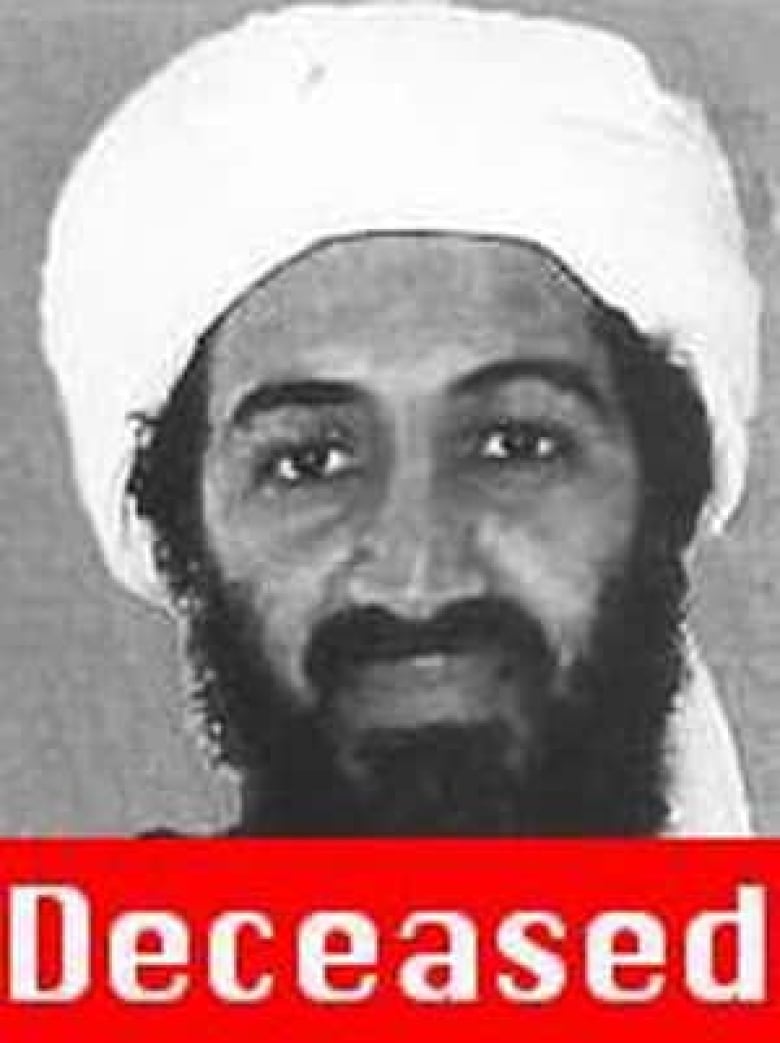Bin Laden death ends 10-year manhunt
Osama bin Laden, the driving force behind the Sept. 11, 2001, attacks, is dead, ending a decade-long manhunt for the world's most-wanted terrorist.
"I can report to the American people and to the world that the United States has conducted an operation that killed Osama bin Laden, the leader of al-Qaeda and a terrorist who is responsible for the murder of thousands of innocent men, women and children," U.S. President Barack Obama announced Sunday night in a statement televised live from the East Room of the White House.
The president said that he had met repeatedly with his national security team members since August and they received information that bin Laden was hiding in a compound in Pakistan. Last week it was determined that the U.S. had enough evidence to take action, he said.

Obama said that at his direction on Sunday, the U.S. launched a targeted attack against that compound in Abbottabad, which is about 150 kilometres north of Islamabad, and that bin Laden was killed in a firefight.
"Justice has been done," the president said in a message that lasted about 10 minutes.
Helicopter raid
U.S. officials said four helicopters carrying CIA paramilitaries and a Navy SEAL team attacked bin Laden's compound; an Abbottabad resident said the raid took place at 1:30 a.m. local time.
After the attack, U.S. personnel took away bin Laden's remains, which were buried at sea following religious rites, a U.S. official said. Finding a country willing to accept the body for burial within 24 hours, in keeping with Islamic tradition, would have been difficult, the official said.
Following the attack, Pakistani television broadcast pictures of flames shooting from the roof of bin Laden's two-storey house in the night sky.
P.O.V.:
Has Osama bin Laden's death changed how you perceive the threat of international terrorism? Take our survey
The development comes just months before the 10th anniversary of the Sept. 11 attacks on the World Trade Center towers in New York and the Pentagon in Washington, D.C. The four airplane hijackings orchestrated by bin Laden's al-Qaeda organization and carried out on that day killed more than 3,000 people, including 24 Canadians.
The attacks set off a chain of events that led the U.S. and its allies into wars in Afghanistan and then Iraq, and America's entire intelligence apparatus was overhauled to counter the threat of more terror attacks at home.
New Yorkers gather
[IMAGEGALLERY galleryid=472 size=small]
In New York City Mayor Michael Bloomberg said bin Laden's death will "bring some closure and comfort to all those who lost loved ones" on Sept. 11.
In New York City, celebrations broke out in Times Square and people began to gather at the site where the World Trade Center towers stood. The site is now a construction zone where a memorial and new tower are being built.
As news of bin Laden's death spread, crowds also began to gather outside the White House. After Obama confirmed the death, the crowd burst into chants of "U.S.A."

George W. Bush., who was president when al-Qaeda attacked the U.S., said the fight against terror continues "but tonight America has sent an unmistakable message: No matter how long it takes, justice will be done."
Harper warns danger continues
In Abbotsford, B.C., Prime Minister Stephen Harper acknowledged the Canadians who lost relatives and friends in the 2001 attacks, and said the death of bin Laden "secures a measure of justice for those Canadians and their families."
"Bin Laden's death does not end the threat of international terrorism," Harper said. "Sadly, others will take his place."
Al-Qaeda was also blamed for the 1998 bombings of two U.S. embassies in Africa that killed 231 people and the 2000 attack on the USS Cole that killed 17 American sailors in Yemen, as well as countless other plots, some successful and some foiled.
With files from The Associated Press
